Historical thinking concepts, otherwise known as discipline-based thinking, are part of the Ontario curriculum. Approaching history this way promotes critical thinking, learning over memorization, and use of primary sources.
Check out this introduction to what HTCs are! (February 2024).

This is a copy of the booklet you have in print. It gives you an overview of how to approach each historical thinking concept.
CHW3M_2024_Historical_Thinking_Concepts_Handout_
History Vs. The Past
Before you dive into a specific HTC, try the activity suggested in this video where you sort the difference between History and the Past. It introduces the main idea that HTCs allow you to analyze history. But first you must understand why history is so analyzable.
The HTCs
Each historical thinking concept has guideposts (key ideas). Here are some guideposts and vocabulary lists. There are links to videos as well:
Historical Significance Guideposts:
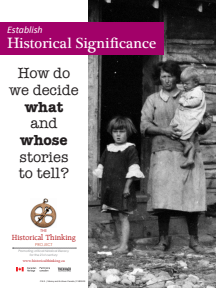
- Did the event result in change? (only applying the first two to Dragons’ Den)
- With deep consequences
- profundity – how did the change affect people?
- For many people
- quantity – which group(s) of people did the change affect?
- Over a long period of time
- durability – for how long did the change affect people?
2. Is it revealing?
- Does it help us understand the past?
- We often study ordinary people (e.g., lower classes, peasants, slaves, women) who didn’t necessarily cause change themselves but who experienced change. So, events chosen as historically significant reveal this unrecognized
3. Different people (groups) at different times have different views of what is considered to be significant.
- A farmer and a king may have had different interpretations of what was most significant in their lives.
- Perhaps a farmer felt certain technology to help water the fields was more important than the king’s great palace architecture.
Historical Significance Vocabulary Note for Dragons’ Den:
Significant: important, key, crucial, meaningful
Criteria: standards, decisions, ranking, determine
Effects: impacts, consequences, results, influences
It is very important that you analyze historical significance rather than just state what you think it is. Apply the criteria of who was most affected and how. In a way this means that you have to understand CHANGE (what was life like before this innovation and what was it like after) and CONSEQUENCES (how were different groups of people affected by inventions).
Video
Video Historical Significance and Dragons’ Den
Continuity and Change Guideposts:

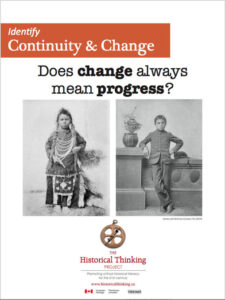
- Continuity and change are interwoven – they overlap. They are not opposites. They can happen at the same time, just like you as a person can remain the same in some ways (hair colour) and develop and change in other ways (height).
- Different groups of people experience progress and decline.
- There are turning points in change, either in pace of change or direction of change.
Continuity and Change Vocabulary Starter List:
Change: evolution, revolution, stray, develop, speed up
Progress: benefit, improve, develop, advance, innovate
Decline: suffer, harm, spiral down, reverse, slow down, regress, collapse, slide
Continuity: same, tradition, holdover, hang onto, preserve, perpetuate
Video
Continuity and Change Video
Causes and Consequences Guideposts:
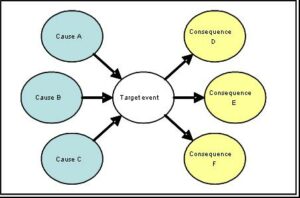
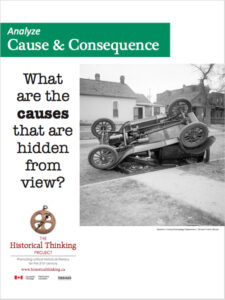
- There are usually multiple causes of an event, not just one.
- Causes can be long-term (underlying/background), medium-term, or short-term (triggers).
- Consequences can be unintended (mostly) or intended.
- Causes can be the result of the work of individuals, groups, and /or social forces (isms). (Like a triangle).
Causes and Consequences Vocabulary Starter List:
Cause: contribute to, lead to, have its origin in, act as roots, force, establish,
Consequence: result in, end up as, lead to, affect, influence, impact
Video
Causes and Consequences Intro Video
Taking Historical Perspectives Guideposts:
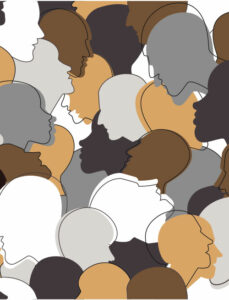
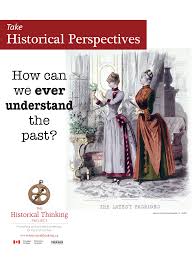
- There’s a big difference between the worldviews of people today (beliefs, values, motivations) and the worldviews of people in the past. Recognizing this gap is crucial. Otherwise, we’ll assume they thought or acted like us.
- Avoid presentism (imposing our own standards or values on the past). Just because technology might have been different in the past, it doesn’t mean it wasn’t highly advanced for its time.
- When you interpret primary evidence, you must look at it within the historical context of its own time and from the historical perspective of who created/wrote it.
- Different groups of people had different views on events. Some people may have dissented from (disagreed with) the mainstream views of society.
Historical Perspectives Vocabulary Starter List:
nouns: point of view, perspective, view, worldview, outlook, angle
verbs: experience, believe, value, consider, think, see, perceive
Video
Taking Historical Perspectives Video
Weighing Presentism and Ethics

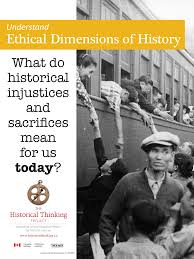
Historical analysis is not always simple. History students are encouraged to have open minds and to make interpretations based on the evidence. However, there are some times when we cannot simply just say that we can’t be presentist. Sometimes, ethics outweigh presentism. Some events in history are just immoral, no matter what the standards of the time were. No matter what time period in history, genocide is always immoral. Slavery was always immoral, even if it was widely accepted in society.
In studying ancient history, which is very far-removed from our lives, we must be careful not to trivialize things that were cruel, unjust and unethical.
This is kind of like a balancing act. A lot of people, especially these days, want to smooth over the horrors of the past saying that prejudice and discrimination was just normal in the past so we shouldn’t worry about it. That is a very simplistic approach that doesn’t take into account the fact that there are ALWAYS dissenters (people who disagree) and were possibly acting to counter the so-called normal trends.
Take the internment of Japanese-Canadians during World War II as an example. If you simply say don’t judge the past by today’s values, meaning don’t criticize the BC and federal governments for their actions against the people (many of whom were Canadian-born), then you are assuming there was never anyone who stood up against this action. There were. There were many.
History is complicated and that is why it deserves a set of tools to analyze it effectively and deeply.
HTC Tracking Sheets
These HTC tracking sheets are very useful for self-evaluation to make sure you’re on the right track.
CHW3M_HTC_Tracking Sheet_Contin-Change
CHW3M_HTC_Tracking_Sheet_Primary_Source_Evidence
CHW_HTC_Tracking_Sheet_Cause-Consequence
CHW3M_HTC_Tracking_Sheet_Hist_Perspectives
CHW3M_HTC_Tracking_Sheet_Ethical_Dimension
There is no tracking sheet for significance. See Dragons’ Den assignment (Cradles of Civ -unit 2)